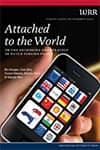The world is changing radically. National borders have become porous, blurring the dividing line between the Netherlands and the rest of the world. The WRR studied the consequences of this for Dutch foreign policy.
Emerging new powers
International relations have changed massively within a relatively short space of time. The dominance of the US is no longer something to be taken for granted. China, India and Brazil are emerging as major new powers, and Russia has regained much of its geopolitical influence. Many Western states, by contrast, are losing influence because of the powerful rise of international organisations, multinationals and interest groups. In addition, the Netherlands has formally handed over traditional powers to international or supranational institutions, is a signatory to international treaties and, partly through the EU, is heavily dependent on others.
Deal with international developments
At the same time, the creeping nature, the reversibility and speed with which the Netherlands is internationalising creates the impression for many in both politics and society that the Netherlands is losing its identity and sovereignty in the sense of the ability of citizens to influence policy. This stokes resistance. It can therefore seem tempting to strive to increase or even recapture formal sovereignty, but that is unlikely to provide a sufficient basis for a meaningful repositioning of the Netherlands in a world where all parties are jostling for new positions. Where and how can the Netherlands exercise influence as effectively as possible, both in order to promote Dutch interests and in order to be able to deal with international developments together with others?
Publication

Image: © WRR
Attached to the world: on the anchoring and strategy of Dutch foreign policy (WRR-report no. 85)
In this report the WRR calls for a strategic approach to foreign policy and suggests a framework to enable clearer choices to be made, for example by emphasising policy domains in which the Netherlands has strength and wishes to position itself for an extended period, such as water management, food or international law. These choices should ensure that the profile, visibility and influence of the Netherlands are increased. By placing more emphasis on the interrelationship between national and international interests in its foreign policy, the Netherlands will also broaden its support at home.
The report was presented to the Minister of Foreign Affairs on 30 November 2010.
